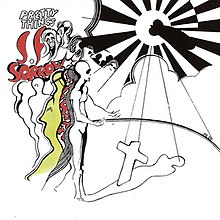S.F. Sorrow
| S.F. Sorrow | ||||
|---|---|---|---|---|
 |
||||
| Studio album by The Pretty Things | ||||
| Released | December 1968 | |||
| Recorded | 1967-68 | |||
| Studio | Abbey Road Studios, London | |||
| Genre | Psychedelic rock | |||
| Length | 40:59 | |||
| Label | Columbia | |||
| Producer | Norman Smith | |||
| The Pretty Things chronology | ||||
|
||||
| Professional ratings | |
|---|---|
| Review scores | |
| Source | Rating |
| Allmusic | |
| The Guardian | |
| Pop Matters | |
S.F. Sorrow is the fourth album by the British rock group The Pretty Things. Released in 1968, it is one of the first rock concept albums.
Based on a short story by singer Phil May, the album is structured as a song cycle, telling the story of the main character, Sebastian F. Sorrow, from birth through love, war, tragedy, madness, and the disillusionment of old age.
Although the album is a rock opera, it has been stated by members of The Who that the record had no major influence on Pete Townshend and his writing of Tommy (1969). The Pretty Things, however, have suggested otherwise, as have some critics.
S.F. Sorrow's narrative is different from others in the rock opera/concept album genre: while Tommy and Pink Floyd's The Wall relay their concept through the lyrics of their songs, The Pretty Things tell the bulk of the story through small paragraph-like chapters which were printed between each song's lyrics in the liner notes of the LP and the CD. These explanatory notes were read aloud between song performances by Arthur Brown during The Pretty Things' first of two known live performances of the opera.
Like Tommy, S.F. Sorrow opens with the birth of the story's protagonist at the turn of the 20th century. Sebastian F. Sorrow is born in a small nameless town to ordinary parents in a house called "Number Three." The town is supported by a factory of some sort, referred to as the "Misery Factory." ("S.F. Sorrow Is Born") Sorrow, an imaginative boy, has a relatively normal childhood until it ends abruptly when he needs to get a job. He goes to work with his father at the Misery Factory, from which many men have been laid off. This might make S.F. the object of hate in a sense that he might be a scab in the story, or perhaps the young boy who is taking some older man's job, and he comes into his sexual adolescence during this period ("Bracelets of Fingers"). Sorrow's life is not yet over, though. Joy still exists for him in the form of a pretty girl across the street. She says 'Good morning' to him every day, and he thinks about her constantly. This is the factor that keeps him going despite his childhood's abrupt ending. The two fall in love and become engaged, but their marriage plans are cut short when Sorrow is drafted ("She Says Good Morning").
...
Wikipedia
